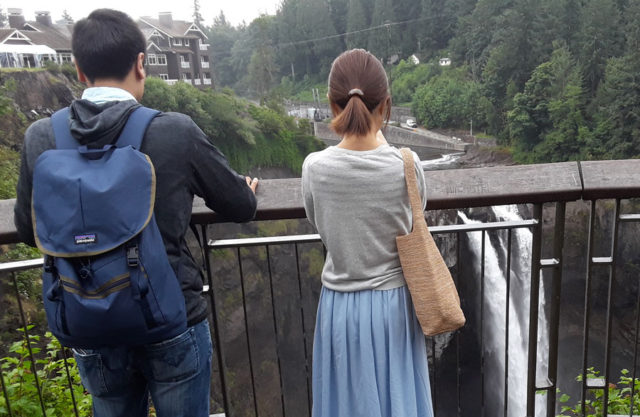By David Yamaguchi, The North American Post
AS I WROTE in the August 9th issue, lately I have been earning part of my living as a bilingual driver-guide for Japanese tourists. Post readers may find these excursions interesting as they provide opportunities for conversing with a cross-section of Japanese travelers.
In early July, I was tasked to pick up a young couple at their downtown hotel, and take them on a half-day trip to Snoqualmie Falls and to the guided tour at Chateau Ste Michelle Winery.
And so on the appointed morning, I met the clients in their hotel lobby. There, the young man explained that they were on their “shinkon ryoko”—their honeymoon. After congratulating them, we were on our way.
Getting through the downtown and Bellevue traffic, at first I focused on my driving. Then, as we got into the clear, I began asking them basic questions in English. Where in Japan were they from? What do they do? Had they turned on the TV in their hotel? If so, had they understood the programming?
They answered Kyoto, that they work in business offices, and yes, but that they had understood only the weather forecast.
My rationale for such initial information-gathering is that as a guide/translator, I need to know who I am talking to. To what extent would they understand wine-making explained by a native-English speaker?
East of Bellevue, I smiled and changed to Japanese— in which I had intentionally not uttered a word.
“Ima wa eigo no shiken no owari desu.” This is the end of your English test, I said, to their visible relief.
Based on my 20-minute pop quiz, I explained that I would give the pair passing grades on basic Traveler’s English, but not yet at the Drama/Movies level. In my mind, the three functional second-language levels, based on my study of Japanese across the years, are Traveler’s Survival Conversation, the Movies level—can we follow an un-subtitled drama—and the harder News level, which requires specialized vocabulary.
I followed up by saying that they had drawn the Japanese-American guide, and that they could practice their English for the day with me if they liked. This is the one perk I can offer that the other guides cannot as naturally. Alternatively, we could converse in my “bata-kusai”—American-accented—Japanese, if they preferred.
The husband replied, “Kono gurai hanaseba, nihongo ni shimashou.” If you speak this much, let’s speak Japanese. (Across 60 trips to date with 2-8 clients, only three individuals have taken me up on my offer.)
AT THE FALLS, I gave the pair a quick overview, took their photos at the overlook, then turned them loose to drink the complementary “Sutaba” [Starbucks] coffee, meander the gift shop, and the like. They knew the falls from—where else—the 1990-1991 cult TV series, “Twin Peaks” (or possibly from its 1992 and 2017 remakes). The drama begins with the finding of the body of a young girl nearby…
With a few minutes to myself, I sat down in a corner of the lobby to drink a coffee, check messages, and then peruse a Seattle Times story about the American women’s soccer team taking the World Cup in France.
As I sat, an elderly man—probably in his early 80s—slowly walked up to the complimentary newspapers table next to me.
“A free newspaper—you can’t beat that,” he said, quietly to himself.
His remark fit because he is from the generations before me that, in my mom’s phraseology, “weren’t served things on silver platters.”
Then the man creakily made his way to the easy chair opposite me and lowered himself down.
He had just opened his paper when a woman’s voice called to him from the adjacent shop. Without saying a word, the gentleman folded up his paper, ponderously stood up, and walked over to see what the lady—apparently his wife—wanted.
At that point, I regathered my ducklings. I explained that between the falls and the winery, I believed they should spend more of their limited time at the falls. For in my view, the very best that Seattle has to offer lies in the natural beauty of its setting. By contrast, winery tours are commonplace.
And so the three of us went back to the viewpoint for one more look. I explained that I needed to do so because, as a Seattle person, I just don’t normally do this.
The wife replied with understanding. ‘We never go to the Kyoto temples.”
Then I brought up the older man. Did you see him in the lobby? They had.
“What he did, is your job, for the next fifty years,” I said, pointing to the young husband. When the older husband’s wife called, he got up to see what she wanted. From this point, the young man’s job would be to respond, to hold things, and to carry things.
AFTER THE WINERY TOUR, the young wife purchased a five-wine sampling, then chose three bottles based on it to take home. The sales lady behind the counter put the purchases in a gift box, then walked the apparently heavy parcel around the counter and set it at her customer’s feet.
I pointed to the box, then to the young husband, with a grin.
“Ya-re!” [Do your job], I said, in my best man-to-man, samurai-movie Japanese.







